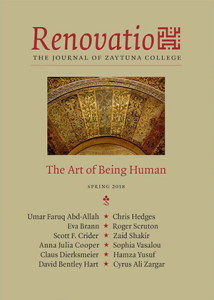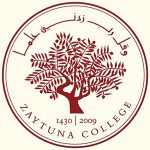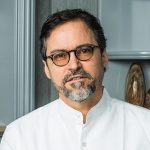Renovatio Journal 3 (Vol.2, No.1 Spring 2018): The Art of Being Human

Editor-in-Chief: Hamza Yusuf
Publisher: Zaytuna College
Year of Publication: 2018
Print Length: 120 pages
Genre: Islamic Studies / Theology, Ethics and Philosophy; Hadith, Sunnah & Sirah, History, Science, Qur’anic Studies; Non-Fiction / Religious Studies
Topic: Muslim, Islam, Qur’an, Prophet Muhammad ﷺ, Ethics & Morality, Metaphysics, Human Nature & Character, Human Psyche, History, Dehumanization, Humanity, Art & Design, Language & Literature, Poetry, Cultural Heritage/Legacy, Civilization, Skepticism; Modernity, Modernism, Modern; Postmodernity, Postmodernism, Postmodern; Religion, Religious Thoughts & Philosophy
Renovatio (renovatio.zaytuna.edu) is a Muslim journal about the ideas that have shaped our past and present world. We ask scholars, theologians, and writers to examine timeless questions and today’s moral challenges by drawing from the enduring texts of revelatory faith traditions and current thinking from philosophy, theology, and ethics to history, politics, the social sciences, and beyond.
Vol.2 No.1: The Art of Being Human
The nature of man, his difference from the animals, and his relation to the divine are topics that have preoccupied philosophers and theologians from ancient times. The Islamic tradition, like the Jewish and Christian traditions, holds that human beings are created in the metaphysical image of God. But modern society has discovered much to undermine man’s proud claim to distinctiveness through reason.
The Spring 2018 issue of Renovatio asks what now remains that makes us distinctively human. Is it the stories we tell, our concern for an ethical life, or, even, the ensoulment of the human embryo? Read the thought-provoking articles and essays we offer from prominent scholars in the United States and abroad.
Table of Contents
Contributors
1. The Human in the Qur’an – Zaid Shakir
How four Qur’anic aspects of humanity combine to make man a distinctive creation.
2. Virtue, Human and Divine – Sophia Vasalou
Can the measure of human virtue be set by the character—or the names—of God?
3. Science and Theology: Where the Consonance Really Lies – David Bentley Hart
If we keep in mind the limits of our methods, the deepest aspirations of the sciences and the most essential affirmations of theology are irresistibly apposite.
4. Humane Being: Learning to be Human – Umar Faruq Abd-Allah & Hamza Yusuf
If we let it, the modern world can alter our fitrah, or the perfection of our natural disposition. But the path to restoring harmony with our natures may be easier than we think.
5. Other People’s Truths – Eva Brann
Sacred scriptures are Great Books, but can they be read as literature in secular settings?
6. An Ethos for All? – Claus Dierksmeier
Why a medieval Christian theologian believed humanity, regardless of creed, could unite around a shared ethic.
7. When Does A Human Fetus Become Human? – Hamza Yusuf
Scripture and science, taken together, can lead believers to rethink our understanding of when life begins, of the miracle of revelation, and most certainly of abortion.
8. The Status of Woman in America – Anna Julia Cooper
The woman conserves those deeper moral forces which make for the happiness of homes and the righteousness of the country.
9. The Secret of the Morality Tale – Cyrus Ali Zargar
Only narratives can ensure our ethics take both intention and circumstance into account.
10. Vanquishing the Monster Within Us – Chris Hedges
When we resist the dehumanizing forces of war, we can see the sacred in all human beings.
11. Sacred Truths in A Profane World – Roger Scruton
Can an alliance of religious believers help humanity begin to emerge from an age of skepticism?
12. From Savagery to Civilization – Scott F. Crider
Poetry fulfills our humanity because it is the language that most makes human culture.
About Zaytuna College

Zaytuna College was founded in Berkeley, California, with a mission to educate and prepare morally committed professional, intellectual, and spiritual leaders who are grounded in the Islamic scholarly tradition and conversant with the cultural currents and critical ideas shaping modern society, through a traditional liberal arts education.
Source: https://zaytuna.edu/about
More from Zaytuna College in this library, click here.

Hamza Yusuf is president of Zaytuna College in Berkeley, California, the first accredited Muslim liberal arts college in the United States. A leading proponent of classical learning, the traditional liberal arts, and great books education in both the Western and Muslim traditions, he has translated, authored, and coauthored numerous publications, including scholarly books and articles as well as papers on major current areas of ethical concern. He holds traditional advanced degrees (ijazaat) in Islamic law and theology, as well as a BA in Religious Studies (San Jose State University) and a PhD from the Graduate Theological Union in Berkeley, California.
Source: https://sandala.org/pages/about-us
More from Hamza Yusuf in this library, click here.
